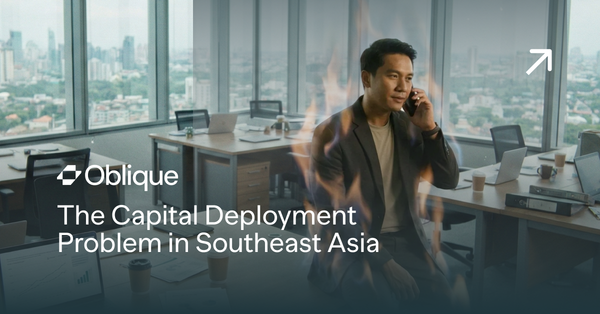Oblique Digest: Southeast Asia’s Power Moves - September 2025
Southeast Asia’s startup map is shifting. The Philippines edges past Indonesia in funding, Sea proves profitability is possible, and AI still draws outsized bets. Here are the power moves and undercurrents shaping the region’s next growth cycle.

This Week’s Power Moves
Philippines Surpasses Indonesia in Startup Funding for the First Time
According to latest figures from DealStreetAsia and CFO Tech Asia, Southeast Asia’s startup funding dropped 20.7% year-on-year in H1 2025, hitting a six-year low at $1.85 billion. Yet the true surprise: Indonesia saw funding collapse 67% to $78.5 million, while the Philippines edged ahead at $86.4 million. Meanwhile, Vietnam’s funding soared 169% to $275 million—outperforming every other market in real growth percentage.
Why it matters: The region’s investor calculus is shifting. Execution, capital efficiency, and regulatory clarity are now trumping market size alone. For founders, this opens the door for rising ecosystems—especially those able to prove high-growth discipline and transparent governance.
Sea Limited Delivers a Blueprint for Sustainable Profitability
Sea Limited stunned markets, posting a Q2 2025 earnings surge of 418% year-on-year to $414.2 million. Revenue climbed 38.2% to $5.3 billion, with Shopee turning a positive adjusted EBITDA ($22.7M profit vs. $9.2M loss last year) and digital financial services revenue jumping 70% ($883M). This operational discipline, bolstered by platform-wide AI and a focus on core unit economics, kicks back against the “growth over profit” playbook.
Why it matters: Sea’s transformation is proof that tech champions can deliver profitability and growth together. For regional startups facing a funding winter, the playbook is clear: smart use of technology, sharper operations, and a relentless push toward sustainable margins now win investor support and public trust.
Region-Wide Ripples
Shopee and Lazada Enter the Fee Era
Effective September 3, Shopee and Lazada imposed a ₱5 order processing fee on every transaction—a move affecting millions of Filipino merchants who already contend with logistics, VAT, and transaction charges. Notably, TikTok Shop has not matched the fee, keeping competition dynamic.
Why it matters: This synchronized fee marks a shift from customer acquisition to platform monetization and maturity. For SMEs, it’s a blunt push to diversify platform strategies and build direct-to-consumer brands; for the platforms, it’s a sign that sustainable profits now take precedence over unchecked growth.
Undercurrents
AI Investment Contradicts the Funding Winter
Despite a regionwide 68% drop in seed funding, top accelerators are doubling down on AI. Antler, via its AI Disrupt residency, deployed $7.4 million across seven Southeast Asian AI startups—each receiving $400,000 plus over $650,000 in cloud credits, far outpacing typical seed check sizes.
Why it matters: This two-speed market means AI-ready teams with traction can still command outsized funding, while most other sectors face a capital drought. It signals that the future of “hot money” in SEA may be sharply verticalized around core tech (AI, automation, advanced SaaS).
Malaysia’s Strategic Play for Startup Diplomacy
As ASEAN chair, Malaysia launched the region’s first comprehensive Startup ASEAN platform, offering founders access to regional networks, cross-border funding, and talent development. Malaysia Digital Economy Corporation’s renewed pact with Thailand’s Digital Economy Promotion Agency already unlocked $47.2 million in potential digital export opportunities.
Why it matters: While Singapore leads for capital and Indonesia for market size, Malaysia is quietly positioning itself as the orchestrator of regional innovation policy. Control of the “diplomacy infrastructure” could allow Malaysia to shape rules and funding flows well beyond its borders.
Signals from the Ecosystem
Fintech Faces New Regulatory Walls in the Philippines
In August, the Bangko Sentral ng Pilipinas ordered GCash and Maya to remove in-app features linking users to online gambling platforms—affecting an estimated 32 million Filipinos who wager online. The move forced both fintechs to rapidly adjust product scope.
Why it matters: Southeast Asian regulators are limiting the “super-app” model. The next wave will favor specialized fintechs (gaming payments, B2B finance, remittances) as consumer protection and regulatory compliance become decisive.
Investment Intelligence
- Execution is trumping geography: Small, well-run ecosystems are now leapfrogging big but unstructured markets.
- Unit economics outshine blitzscaling: Profitable tech is investable tech again.
- Regulatory clarity is a power move: Navigating and shaping the regulatory landscape is a competitive advantage.
These shifts mean the 2025 “funding winter” is more than a dry spell—it’s the start of a new, durability-focused era for Southeast Asia’s digital champions.





